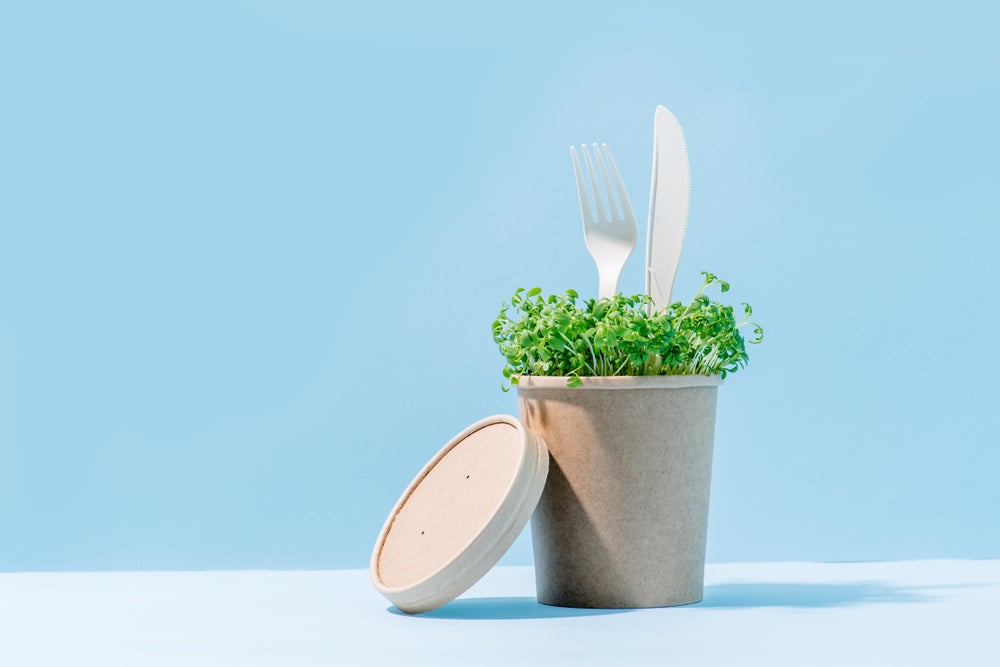
Due to a shortage of facilities and systems designed for composting, a significant portion of compostable packaging is not able to go through the proper composting process.
As a result, these compostable materials end up being disposed of in regular waste streams, leading to their inefficient decomposition and negating the environmental benefits they could offer.
According to David Henkes, a food-industry analyst at Technomic, in 2021, approximately 7 percent of all food-service packaging was compostable, and this share has likely increased, especially in major cities.
Nevertheless, without a robust composting system in place, compostable plastic simply behaves like regular plastic, negating its potential environmental benefits.
Compostable plastic’s promises and limitations
Compostable plastic is created by chemically manipulating plant sugars, such as corn starch and sugar cane, to mimic the properties of traditional plastic. While the promise of compostable plastic is to degrade over time, the reality is more complex.
Compostable plastic requires specific conditions to decompose effectively, typically only achievable in industrial composting facilities. Home compost piles cannot achieve the necessary conditions to break down compostable plastic efficiently.
Studies have shown that even after several years, compostable plastic can remain largely intact. Commercial composting plants, with their controlled environments and specialised machinery, offer the best chance for timely degradation.
However, the number of these facilities in the United States is limited, with only about 200 full-scale food-waste composting plants, and most of them accept compostable packaging.
This situation leaves a vast majority of the population, residing outside cities like San Francisco, Seattle, and parts of New York, without access to composting infrastructure.
Striving for a compostable future
Aware of these limitations, companies that use compostable products are cautious about their claims. Many acknowledge the scarcity of composting facilities and the challenges associated with proper disposal.
Nevertheless, the long-term goal for companies distributing single-use items is to transition to compostable alternatives.
Converting single-use plastic into biomass through composting offers a far more environmentally friendly solution than the majority of plastic waste ever managed.
Replacing conventional plastic with compostable plastic, when supported by robust infrastructure, could make a significant positive impact. However, as long as compostable plastic ends up in landfills, it loses its favourable environmental qualities.
In such conditions, compostable plastic may take over a century to biodegrade, and some types can even release methane, a potent greenhouse gas, in anaerobic landfill environments.
Seeking a balance for compostable alternatives
While compostable plastic shows potential as a sustainable alternative, its effectiveness is currently limited by the lack of composting infrastructure.
The US federal government and numerousprivate companies are investing in the development of composting facilities, recognising the importance of diverting compostable waste from landfills.
Efforts are underway to improve the quality and durability of compostable products, exploring innovative materials like protein powder plastic, banana-peel plastic, avocado plastic, and seaweed plastic.
However, finding the right balance between durability and compostability remains a challenge.
In the meantime, consumers can make informed choices by looking for compostable products certified by the Biodegradable Products Institute (BPI) and the TÜV OK Compost Home standard, which ensures disintegration even in home compost piles.
It is also advisable to avoid products made of polylactic acid (PLA), as this type of compostable plastic can be difficult to break down. Opting for utensils made of untreated wood, which are inherently compostable, is another eco-friendly alternative.
Ultimately, while compostable plastic holds promise as a solution to single-use plastic waste, a comprehensive composting infrastructure is crucial to realise its environmental benefits.
Efforts to expand composting facilities, coupled with continued innovation in compostable product development, will pave the way for a more sustainable future. In the meantime, consumers can also explore reusable options, such as metal utensils, to reduce their reliance on single-use plastics altogether.



